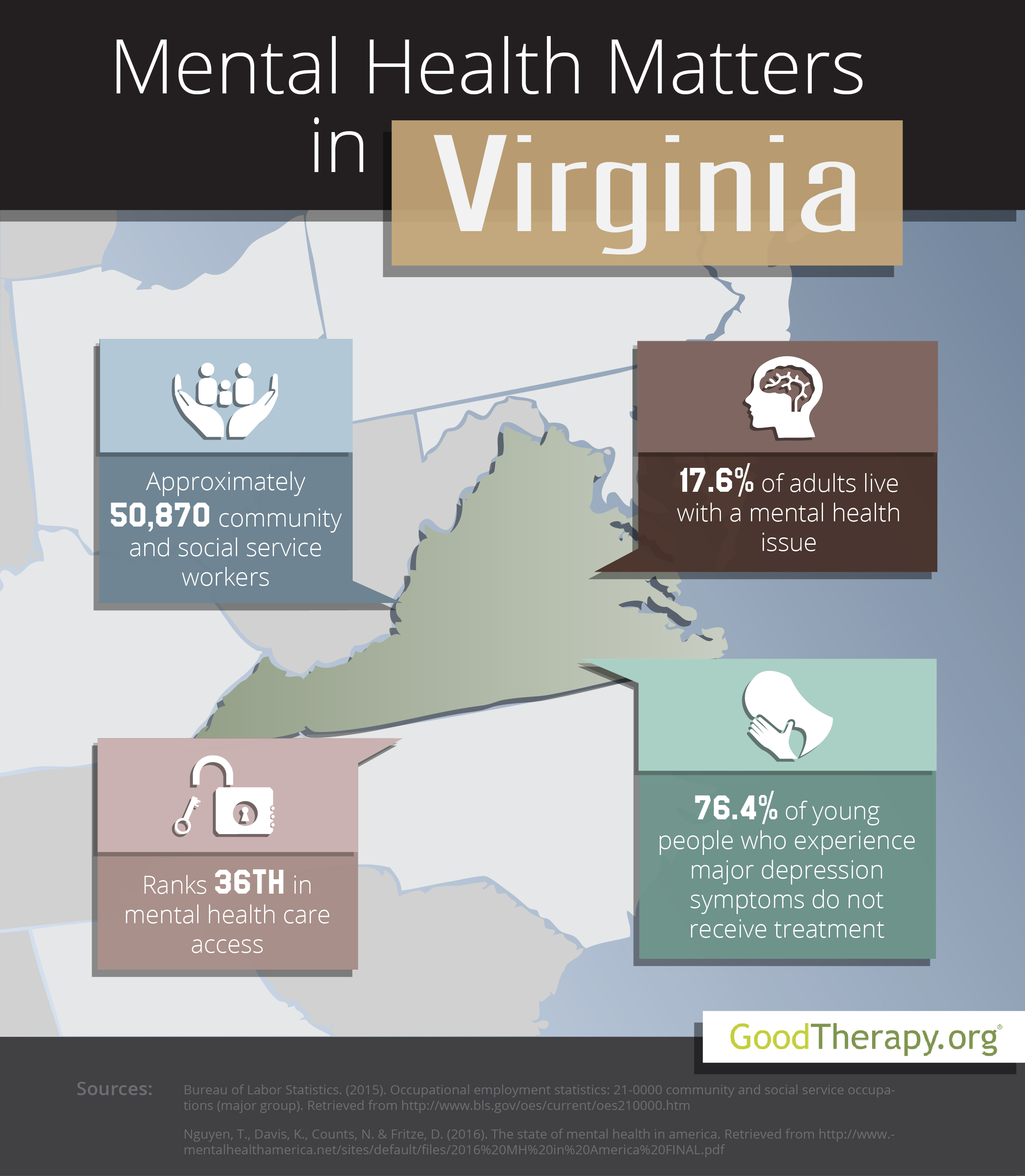Find a Therapist in Virginia
Welcome to the Virginia therapist directory at GoodTherapy.org. Our directory is the fastest and safest way to find a good counselor or therapist in Virginia cities. We only include professional therapists, counselors, and psychologists whose work accords, in attitude and orientation, to the elements of good therapy. Find a therapist or counselor in your Virginia zip code, or click on the links below to see the counselors in your city. If you are looking for telehealth therapy you can click here to see all Virginia telehealth therapists.
Albemarle County
Carroll County
Fairfax County
Fauquier County
Hanover County
Harrisonburg City County
Henrico County
James City County
Loudoun County
Madison County
Manassas City County
Montgomery County
Newport News City County
Norfolk City County
Powhatan County
Prince William County
Richmond City County
Stafford County
Suffolk City County
Virginia Beach City County
Mental Health Matters in Virginia
Nearly 8.4 million people were living in Virginia in 2015. Approximately 50.8% of the population is female. The ethnic and racial makeup of the state population consisted primarily of 70.2% residents who were white, 19.7% black residents, 6.5% Asian residents, and 0.5% American Indian and Alaskan Native residents. Young people under 18 years make up 22.3% of the population, while elderly people 65 years or older make up 14.2%. Vermont is home to 718,034 veterans.
Employment data shows 50,870 residents worked in community and social service occupations in 2015, earning an average salary of $47,660 for workers in this field.
 Mental Health in Virginia
Mental Health in Virginia
In 2016, Mental Health America (MHA) conducted a survey to gauge and compare the mental health conditions and rate of access to treatment in all 50 states and the District of Columbia. At the conclusion of this survey, the state of Virginia was given an overall mental health rank of 42nd, placing in the bottom 10 of all states. Analysts from Mental Health America and some therapists in Virginia are of the opinion that this low ranking for overall mental health is influenced by low rates of high school graduation for students with disabilities in the state. Virginia also placed 17th in adult ranking, 46th in youth ranking, 29th in prevalence of mental and behavioral health issues, and 36th in access to professional mental health care.
At 17.6%, Virginia has the ninth-lowest percentage of adults with mental health issues in America. This high ranking is influenced by low rates of homelessness, poverty, violent crime, and child maltreatment in the state. However, MHA research also shows young people in Virginia have a higher prevalence of mental health issues than adolescents in many other states. The 2016 MHA survey suggests depression among the younger population is a pressing concern for local mental health providers. Virginia was ranked 45th for young people with episodes of major depression in the past year, and 46th for young people with severe symptoms of major depression.
It may be difficult for individuals to find a therapist in Virginia, as the ratio of residents to mental health providers currently stands at 724:1. As a result, the state is ranked 42nd for adults with mental health concerns who report unmet need, 40th for young people with severe depression symptoms who received consistent treatment, and 49th for young people with major depression who did not receive any depression treatment at all.
References:
-
Bureau of Labor Statistics. (2015). Occupational employment statistics: 21-0000 community and social service occupations (major group). Retrieved from http://www.bls.gov/oes/current/oes210000.htm
-
Nguyen, T., Davis, K., Counts, N. & Fritze, D. (2016). The state of mental health in america. Retrieved from http://www.mentalhealthamerica.net/sites/default/files/2016%20MH%20in%20America%20FINAL.pdf
-
Substance Abuse and Mental Health Services Administration. (2014). Behavioral health barometer: Virginia, 2014. Retrieved from http://www.samhsa.gov/data/sites/default/files/State_BHBarometers_2014_2/BHBarometer-VA.pdf
-
United States Census Bureau. (2015). Quick facts: Virginia. Retrieved from https://www.census.gov/quickfacts/table/PST045215/51
Advanced Search | Browse Locations | International Search